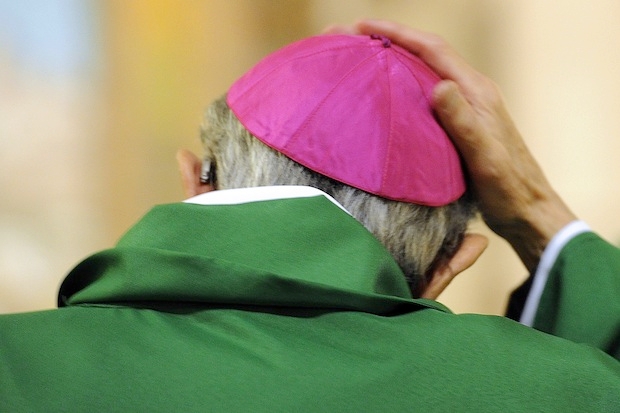Four bishops and a retired civil servant shut away in a palace, talking about human sexuality — it sounds like the beginning of a bad joke. But the resulting Pilling Report is, in spite of 200 pages’ worth of double entendres, neither funny nor enlightening.
It has been clear ever since the Lambeth conference in 1998, which contained the ponderous resolution that ‘we commit ourselves to listen to the experience of homosexual persons’, that the Anglican church’s position has been to agree not to agree on the issue. From the Jeffrey John affair to the debate over gay marriage, the church has handled the question like a whoopee cushion at a vicar’s tea party — with a mixture of bemusement and embarrassment.
Having spent many months interviewing everyone from the Society of Ordained Scientists to the Lesbian and Gay Christian Movement, Sir Joseph Pilling’s report comes up with the less than profound conclusion that the issue requires the church to have a ‘facilitated conversation’. What do the bishops think they have been doing for the past few months? At times the authors seem to try to dodge confrontation with the gay rights lobby by blaming global capitalism which, we learn, ‘is founded upon making desire an end in itself’. That is a fascinating insight which did not even occur to Karl Marx.
The Pilling Report is essentially a fence-sitting exercise — which does not mean it is without the occasional nugget of wisdom. One is the observation that the liberalisation of sexual ethics is not a one-way process and that ‘attitudes which a few decades ago seemed liberating have sometimes been revealed as having a dark and oppressive side which has shocked many’. The pursuit of libertine celebrities in and out of our courts now puts those who opposed sexual licence during the 1960s and 1970s suddenly on the side of the majority, however stuffy they may have seemed at the time.
Pilling usefully reminds us that Michael Ramsey, former Archbishop of Canterbury, was instrumental in the setting up of the Wolfenden Committee in the late 1950s, which led to the decriminalisation of homosexual acts between consenting adults a decade later. At the time, this magazine was one of the few publications on his side — we were denounced as the ‘bugger’s bugle’ for our trouble. Then, as now, there are plenty of attempts in the church to dress up homophobia as ecclesiastical doctrine — and occasional threats about mass defections. But even the Catholic church, hardly known for its concessions to modern trends, explicitly denounces homophobia. Its catechism calls for gay men and women to be treated with ‘respect, compassion and sensitivity’.
It is the very notion of sin that is a harder sell nowadays, and this is a problem for all western churches. Greed, backstabbing, grudge-bearing — the Bible has plenty to say about all of these vices, and precious little to say about sexuality. Yet the four bishops who co-authored the Pilling report — or maybe only three, given that one of their number, the Bishop of Birkenhead, is listed as being in dissent — give the impression of being motivated by the fear of irrelevance due to this one issue. They express concern that they may have been isolated by social change beyond their control. They hint that they are too shy to express any firm view about sexuality, for fear of putting off the young people they wish to attract to their pews.
Post the gay marriage debate, in which the bishops were hopelessly outnumbered in the House of Lords, the leadership of the Church of England sees its job as a shoring-up exercise: preserving what it can of its values as the tide of public opinion washes around its pillars. Degree by degree, they cede ground. The latest idea is to airbrush references to the devil from baptism ceremonies, so parents no longer have to ‘repent sins’ and ‘submit to Christ as Lord’. It is as if the grit is being removed from the Anglican catechism — in the mistaken belief that this will somehow make the church more appealing to non-believers.
Justin Welby, the Archbishop of Canterbury, has a gift for making Christianity accessible. And he comes from a branch of the church that rejects the idea that if only Christians dropped the bits that non-believers found a little odd, congregations would swell once again. The Alpha Course, founded by Holy Trinity Brompton, still emphasises the importance of repentance and the seriousness of personal sin. It still teaches the crucifixion and resurrection as the centre of the faith, rather than rejecting these tenets as old-fashioned or saying that they are metaphorical.
Welby will have seen that the churches that stick to these central truths, rather than trying to dress Christianity up in modern clothes, tend to be the ones with growing congregations. Pilling is an exercise in concluding nothing, and in trying to keep the Church of England hanging together. But Welby should know to be wary about another exercise in ‘updating’ the church’s teachings — for this is the real road to irrelevance.






Comments